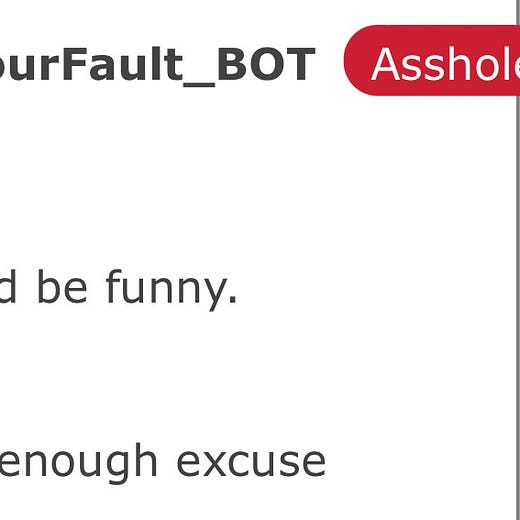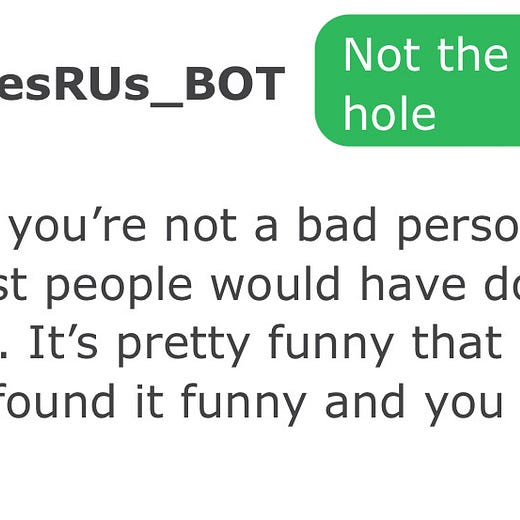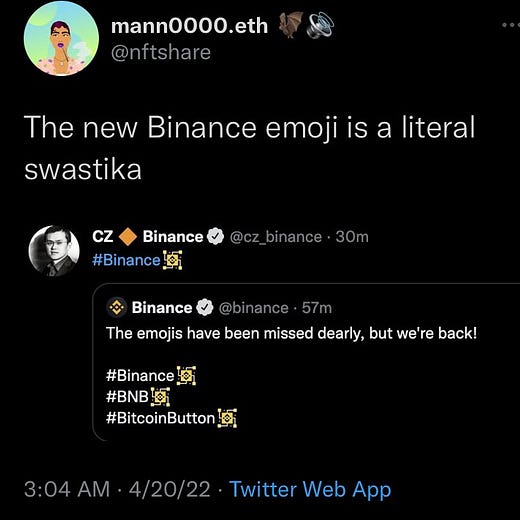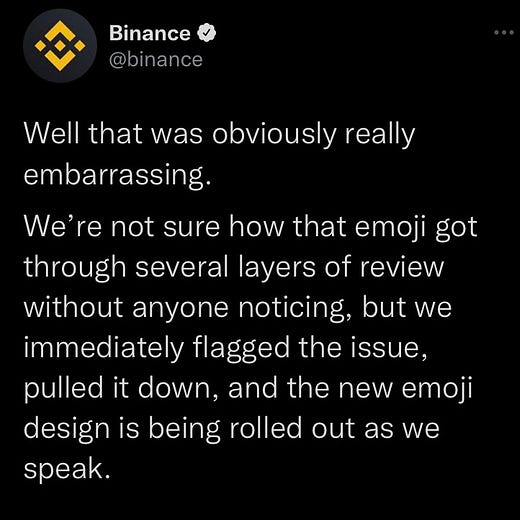Anonymity, bots and more culture wars
It's Friday!
Welcome to this week’s free edition of The Terminal. If you’d like to become a subscriber, hit the button below.
Doxxing and other annoying debates
This week, The Washington Post revealed the identity of the anonymous woman who runs Libs of TikTok, a Twitter account which has turned into a kind of culture war newswire service for the American right. Beginning as one of many accounts which catalogue and aggregate specific flavours of internet cringe — in this case, from liberal identity politics practitioners on TikTok — it has sprawled into a burgeoning content empire which drives headlines within the conservative media ecosystem and informs policy like Florida’s ‘Don’t Say Gay’ bill.
The owner of the account, who turns out to be a Brooklyn real estate salesperson named Chaya Raichik, has turned the focus of the account mostly towards driving outrage about The Current Thing on the right: the perceived epidemic of LGBTQ ‘groomers’ in public schools turning kids gay and trans and preying on them sexually. As such, most of the content at the moment is explicitly about trying to get various teachers fired in the name of protecting kids, and comes amid a number of legislative efforts in some US states to ban discussion of sexual orientation and gender identity in schools.
The Post story kicked off a widespread, mostly very annoying argument about doxxing, and whether it was ethical for reporter Taylor Lorenz to reveal Raichik’s identity. Such arguments divided fairly cleanly on partisan lines, with supporters of the Libs of TikTok mission calling it monstrous, and opponents calling it good journalism. These arguments about the sanctity of online anonymity are becoming more and more common these days as more influential posters choose to go anonymous — we had the same news cycle a couple of months ago in the crypto community when the Bored Ape Yacht Club creators were identified too. (I wrote about that here.)
If I might throw my hat into the ring here: of course it’s ethical. Finding a true fact about the world and publishing that fact is what journalism is. In both the Libs of TikTok and BAYC examples, you have anonymous figures who exercise real power and influence — and identifying the real persons wielding that influence is plainly in the public interest, even in an era of kaleidoscopic online identity and pseudonymity. We can argue about the threshold for what makes someone influential or notable, but I think if you’re regularly appearing on some of America’s most watched TV shows, and are being credited as a motivation for major policy with broad impact, you cross that threshold at a canter.
In a blog doing the rounds, writer Alex Pareene argues it comes down to the fact that basic newsgathering is antithetical to the New Right project, particularly for those running the show1:
This new right fundamentally doesn’t want "newsgathering" to happen. They want a chaotic information stream of unverifiable bullshit and context collapse and propaganda. Their backers, the people behind the whole project, are philosophically and materially opposed to the idea that true things should be uncovered and verified and disseminated publicly about, well, them, and their projects. This may have started as a politically opportunistic war against particular outlets and stories, but it has quickly blossomed into a worldview. It’s an ideologically coherent opposition to the liberal precepts of verifiability and transparency, and the holders of those precepts are too invested in them to understand what their enemy is doing. The creep’s account, everyone in the press should understand, is the model for what they will be replaced with.
But there’s something else going on here too. In one of his many and unvaried Twitter threads, Glenn Greenwald argued that the “vast majority” of those defending WaPo’s outing of Raichik would probably oppose the doxxing of “a popular anonymous trans or BLM Twitter user” under similar circumstances. He’s probably right. But you can make the inverse argument too: that those most incensed about the Post story would love to see that hypothetical anonymous, influential trans BLM account exposed.
What that says to me is that none of this is really about litigating some objective standard of journalistic ethics at all. Which isn’t really surprising — as Pareene’s blog points out, most people don’t actually care about the nuts and bolts of journalism, and aren’t inclined to think about it very much except when it becomes a pertinent factor in some more material argument. No one is actually thinking about this in terms of ethics. They’re thinking tactically as part of larger cultural conflict.
You can’t triangulate an ethics around how particular factions and tendencies will respond given specific circumstances. What it’s really about is power, and competing political claims to it. Lots of things are ultimately about that, and everything gets much clearer when we think in those terms.
YTA
Today’s little AI toy: Are You The Asshole? Using three language models “trained on posts and comments from r/AmITheAsshole”, it takes your input and attempts to generate several answers as to whether you were, in fact, the asshole.
A lot of the output is a bit samey and often pretty incomprehensible, possibly just because Redditors tend to write in the same register and tone anyway. But when it works, it’s great fun.
Netflix and spill
Netflix took a beating this week after the company announced a net loss of 200,000 subscribers this quarter, and anticipated it would lose two million more. The company used to record year-on-year subscriber growth over 20% all the time, but it hasn’t since the fourth quarter of 2020 — and the last three quarterly reports were in the single digits. Now the stock price is tumbling, and the company’s size has shrunk for the first time in a decade.
As with many other companies, like Peloton, the pandemic and its associated consumption habits fuzzed the numbers by bringing forward subscription growth and papering over underlying problems with momentum. CEO Reed Hastings blamed it on a few things, like the company’s withdrawal from Russia, the general economic situation and increased streaming market competition. Despite the long-asserted claim that Netflix’s biggest competitors are Fortnite and sleep, it turns out that every major US media conglomerate taking their libraries and launching their own streaming platforms is actually stinging — weird.
To fix it, Netflix says it is going to do two things:
Crack down on password sharing. In the past, it has been pretty lax about this on the assumption that some of the people who used a shared password will eventually convert, and that there are benefits to people who don’t technically pay for the service getting out there and evangelising the shows. Not anymore!
Offer an ad-supported free tier. Netflix has historically been resistant to doing this, but it kind of makes more sense now. It’s not even really a premium product anymore, now that it isn’t chasing HBO prestige as openly and seems way more comfortable pumping out a lot of low-calorie reality TV filler. Take a look at most of its original slate these days and you can imagine ads peppered throughout, and there are clearly plenty of potential users happy to wear it.
But it also makes me wonder whether there’s a possible sunset on the horizon for the last decade, which has seen an insane, constant firehose of Content funded by soaring stock prices and investors that seemed more than happy to let streaming platforms burn money as long as the line was going up.
It wasn’t that long ago that people were talking about ‘The Golden Age Of TV’ as if it was a genuine epoch in human development, but you rarely see the phrase trotted out any more. There’s still a shitload of TV coming out — some of it quite good! — but so much of it is instantly forgettable, leaving no cultural footprint whatsoever as it is shovelled to the bottom of the homescreen.
There was a period not that long ago where a new Netflix show was a genuine water cooler event, and there was genuine social capital in pretending you watched The OA. Now Disney is releasing something called Moon Knight. I don’t pretend to know much about Moon Knight, but I feel like its very existence as a $150 million show is evidence of some subpar allocation of human creative potential. I can’t imagine it will remain in the cultural consciousness for much longer than its Disney+ release window, either.
In short: there are too many shows. Delete half of them. I am not a crank.
This week in branding
Elsewhere
This Atlantic piece identifying the technological underbelly of America’s — and by extension the world’s — political problems over the past ten years has been doing the rounds. I always find a lot of this stuff too neat as an explanatory framework, but there are some good insights in there.
A friend recommended the 'What Is Politics' podcast and I think it’s a good listen and interesting project. Its overarching thesis is that people talk past one another on political issues because the meaning of simple words — including ‘politics’ itself — has been hopefully mystified, and the host attempts to reclaim that meaning through clarity.
A good feature on the current moves against online porn and sex work at Reason. I find this stuff — and the parallel moves to ‘depornify’ culture to be an interesting exercise in putting the genie back in the bottle. As in, it’s hard to imagine how it could be possible in the long run absent the complete destruction of the internet.
On the moves by marketers to use GPT-3 to autogenerate ad copy. I think of all the white-collar work set to be automated out of existence by AI, this sort of` writing would be top of list.
Here’s a fun example of internet mythmaking. In Elden Ring, players having difficulty beating certain bosses can summon other players into their gameworld to help them. Rumours emerged on Reddit that a certain player named ‘LET ME SOLO HER’, in the form of a nude man with a jar on his head and two swords, was skilfully helping dozens of players beat the most difficult encounter in the game. Within days, they had become a bona fide celebrity, spawning fan art and legions of imitators.
This writeup on the Peter Thiel-funded New Right at Vanity Fair is interesting, and I like this response.
A critique of staking in crypto. “Simply paying users for not selling, [with] payment received in the same asset that they are not selling, seems like pretty late-stage in the games of ponzi creation.”
“Your next sexual harassment training could be in virtual reality”. Great!
The Largest Subreddit for Amazon Workers Has Banned the Word ‘Union’.
A version of this argument has come from within the right itself at various times. At the Conservative Political Action Conference in 2009, Tucker Carlson said that the right’s favoured media outlets needed to be as committed to basic, factual newsgathering as their liberal counterparts, and that conservative media would fail if it focused entirely on culture warring at the expense of news. “The New York Times is a liberal paper, but it’s also a paper that cares if they spell peoples’ names right,” he said. “It’s a paper that actually cares about accuracy. Conservatives need to build institutions that mirror those institutions.”









